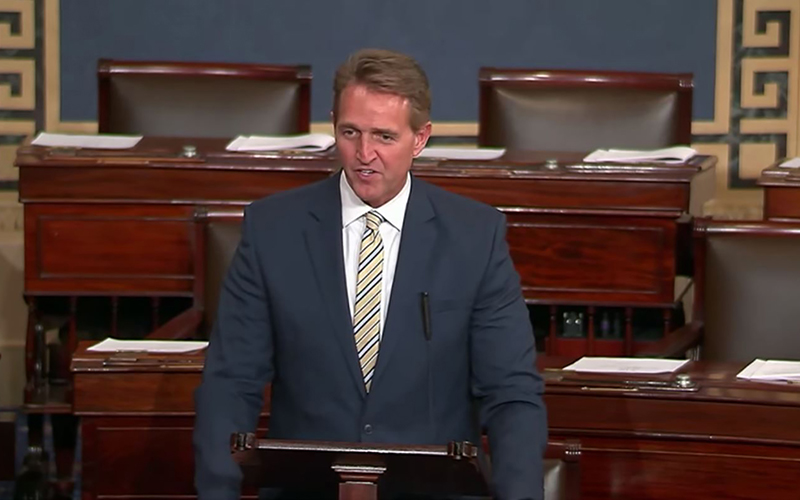WASHINGTON – Arizona’s two senators took President Donald Trump to task in separate forums Wednesday, saying his attacks on the press and “fake news” claims embolden dictators to crack down on news media abroad and endanger democracy at home.
The rebukes by Republican Sens. John McCain and Jeff Flake came the same day that the president released the “Fake News Awards” to reporters and media outlets he calls dishonest.
A White House spokeswoman dismissed Flake’s comments Wednesday as “unfortunate” and a bid for attention. Reaction in Arizona ranged from praise for the senators’ “highest integrity” to charges that the two are out of touch with voters and should instead be defending a president who is finally speaking truth about news organizations.
“I’ve been waiting almost 40 years for someone to fight back, and we love it,” said Peoria resident Corky Haynes, a Trump delegate at last year’s Republican National Convention.
In a “Washington Post” opinion piece published in Wednesday’s paper, McCain invoked President Ronald Reagan’s defense of liberty as a beacon for the world but said Trump’s “unrelenting attacks on the integrity of American journalists and news outlets … has provided cover for repressive regimes to follow suit.”
“The phrase ‘fake news’ – granted legitimacy by an American president – is being used by autocrats to silence reporters, undermine political opponents, stave off media scrutiny and mislead citizens,” McCain wrote. He pointed to an increase of journalists imprisoned around the world in the last year, including 21 held on “fake news” charges.
Flake took to the Senate floor later Wednesday morning for an impassioned 14-minute speech in which he compared Trump’s characterization of the media as an enemy of the people to language used decades ago by Soviet dictator Josef Stalin.
“It is a testament to the condition of our democracy that our own president uses words infamously spoken by Josef Stalin to describe his enemies,” Flake said. “It bears noting that so fraught with malice was the phrase ‘enemy of the people’ that even (subsequent Soviet Premier) Nikita Khrushchev forbade its use, telling the Soviet Communist Party that the phrase had been introduced by Stalin for the purpose of ‘annihilating such individuals’ who disagreed with the supreme leader.”
Flake said the president’s attacks should be a source of shame for all senators, “especially for those of us in the president’s party.”
“No longer can we compound attacks on truth with our silent acquiescence, no longer can we turn a blind eye or a deaf ear to these assaults on our institutions,” he said. “A Congress that fails to act as a check on the president adds to the danger.”
Flake said before his speech that he did not know McCain had written his piece chastising the president, but he echoed many of McCain’s points about threats to free press. He said he decided to give the speech Wednesday because “words have consequences” and that the “fake news mantra” repeated by the president is being used by dictators to arrest journalists around the world.
Courtney Radsch, advocacy director for the Committee to Protect Journalists, said arrests of journalists around the world grew over the previous year, with the president’s rhetoric giving cover to a more than doubling of journalists arrested on fake news charges.
The committee’s website said 262 journalists were in prison worldwide in 2017, up from 259 in 2016 and 199 in 2015. Although many arrests would have happened anyway – “China doesn’t need Trump” to arrest journalists, Radsch said – the debate has definitely shifted under this administration.
“The U.S. in the past has been a beacon of free press,” and past presidents could generally be relied on to raise press-freedom issues with foreign countries, she said. “We don’t have that anymore.”
That both Arizona senators spoke out shows that “press freedom is not a partisan issue … it is fundamental of a free democracy,” Radsch said.
During a briefing Wednesday, White House spokeswoman Sarah Huckabee Sanders said she had not read all of McCain’s piece, but she suggested that Flake’s speech was motivated not by any principles but by his low poll numbers. Flake is not running for re-election in 2018.
“He’s not criticizing the president because he’s against oppression,” Sanders said, according to a White House transcript of the briefing. “He’s criticizing the president because he has terrible poll numbers and he is, I think, looking for some attention.”
A Morning Consult poll in October said Flake and McCain were the second- and third-least popular senators in their home states, respectively, trailing only Senate Majority Leader Mitch McConnell of Kentucky. But neither McCain, who has a deadly form of brain cancer, nor Flake has anything to lose by criticizing the president.
David Wells, an Arizona State University political science professor, criticized the White House response.
“Arizona is lucky because we have two of the members of the Senate with the highest integrity … willing to speak truth to the irresponsible behavior in the White House,” Wells said.
But Haynes, a retired schoolteacher, defended the language used by Trump, who she said is “fighting to stop the lies and the brainwashing out there.”
“I don’t really think Senators Flake and McCain represent Arizona,” Haynes said, “especially the Republican Party.”
